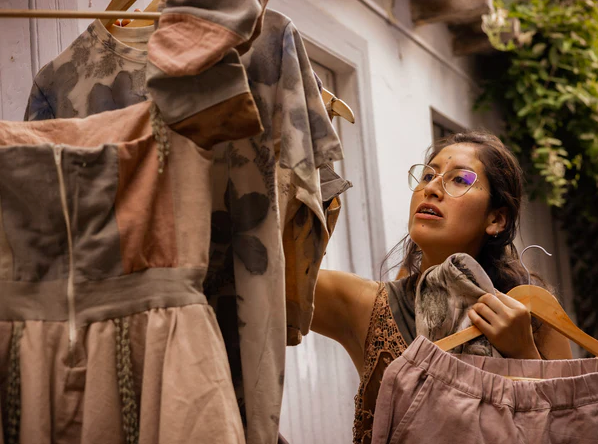
“Camino vegetal”: a sustainable and regenerative fashion catwalk
Share

By Evelyn Chacon
Last evening, July 15th, in Barranco, fashion and sustainability intertwined in an exciting fashion show that left a positive mark on our hearts. The sustainable and regenerative fashion catwalk “Camino vegetal”, organized by Pasiflora within the framework of the Day of Organic Cosmetics, was much more than a style exhibition; it was a tribute to nature, local craftsmanship and environmental awareness.
With fabrics and designs made by the Yanesha Wamprat Artisans Association of Lomalinda in Palcazú, Pasco, and the collaboration of the talented designer Elizabeth Luna, the catwalk reminded us of the beauty of a world in balance with nature.

A slow fashion proposal
The “Camino vegetal” proposal showed an alternative to current fast fashion in which the ingredients, details, shapes and history behind each garment have a positive impact on our environment. The use of each garment represents a green revolution for our allies, the Yanesha artisans, who allow us to offer this alternative through artisanal and natural intelligence.

The fabrics, carefully woven by the skilled hands of the artisans, captured the essence of ancestral tradition and love for nature. The techniques used were botanical printing and vegetal dyeing based on plants and flowers from the region, such as eucalyptus, risino, molle, roses, turmeric, achiote, among others. These ancestral techniques allow obtaining vibrant and long-lasting colors, without using chemical products harmful to the environment. Thus, each garment told a story, a tribute to nature and the wisdom transmitted from generation to generation.
A fusion of tradition and creativity
In the moments leading up to the show, the techniques used were presented to the audience, from the moment of preparing the fabrics to the presentation of the designs thanks to the six models, among them a young woman belonging to the Kukama community.

Likewise, the presence of Rosana Espíritu, one of the talented Yanesha artisans, and the visit of other artisans belonging to other ethnic groups such as Shipibo Konibo was a living representation of the dedication and effort of local communities to preserve their traditions and contribute to sustainable development.


Commitment to the environment
The use of local and natural materials in the creations was one of the pillars of this sustainable catwalk. 100% natural cotton, grown and worked by families in the central jungle region, became the basis of the garments. Its softness and versatility highlighted the connection with Mother Nature and the importance of promoting environmentally friendly fashion.
In addition, carefully designed and crafted accessories made of wood and bamboo underlined the preference for sustainable and biodegradable materials. These details reflected the designers' commitment to preserving resources and reducing the environmental footprint.


The “Camino Vegetal” catwalk in Barranco left us with a sense of hope and renewal. It was a powerful reminder that fashion can be much more than a passing trend; it can be a driving force for positive change in the world.
Through the designs made with love and dedication by Yanesha artisans, and the creative vision of Elizabeth Luna, we witness a celebration of sustainability, tradition and harmony with nature.
Let this show be just the beginning of a movement that inspires more designers, consumers and communities to weave a sustainable future where fashion is a reflection of our respect and care for the planet we call home. By supporting these kinds of initiatives, we can contribute to a more just and sustainable world.

1 comment
FELICITACIONES por tan maravilloso trabajo !
Agradezcamos siempre a la madre tierra por las bondades que nos ofrece y llevemos el mensaje que si se puede vivir de una manera respetuosa y sostenible con el planeta.